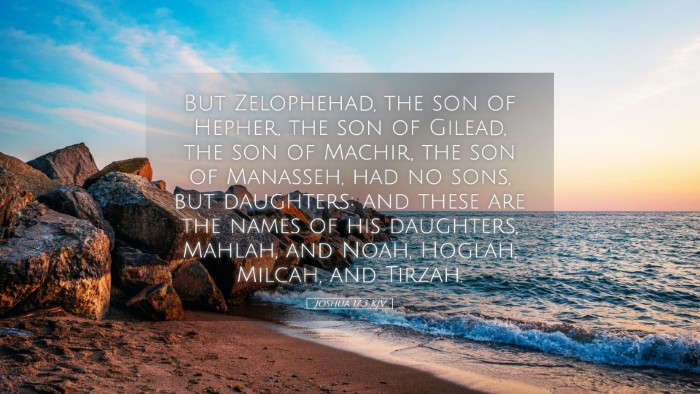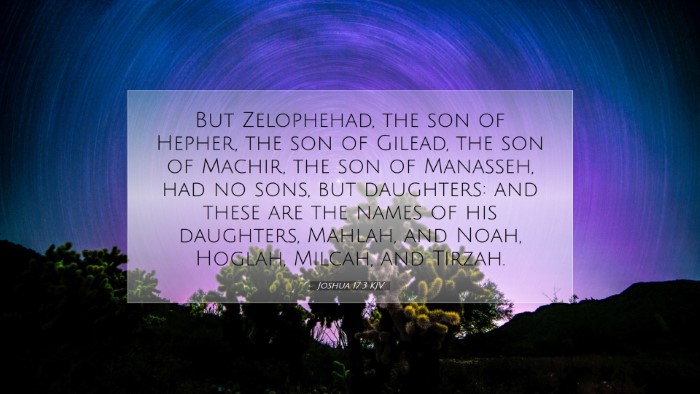Old Testament
Genesis Exodus Leviticus Numbers Deuteronomy Joshua Judges Ruth 1 Samuel 2 Samuel 1 Kings 2 Kings 1 Chronicles 2 Chronicles Ezra Nehemiah Esther Job Psalms Proverbs Ecclesiastes Song of Solomon Isaiah Jeremiah Lamentations Ezekiel Daniel Hosea Joel Amos Obadiah Jonah Micah Nahum Habakkuk Zephaniah Haggai Zechariah MalachiJoshua 17:3
Joshua 17:3 KJV
But Zelophehad, the son of Hepher, the son of Gilead, the son of Machir, the son of Manasseh, had no sons, but daughters: and these are the names of his daughters, Mahlah, and Noah, Hoglah, Milcah, and Tirzah.
Joshua 17:3 Bible Commentary
Bible Commentary on Joshua 17:3
Joshua 17:3 states: "But Zelophehad the son of Hepher, the son of Gilead, the son of Machir, the son of Manasseh, had no sons, but only daughters; and these are the names of his daughters: Mahlah, Noah, Hoglah, Milcah, and Tirzah."
This passage presents a significant account concerning the inheritance of the tribes of Israel, specifically focusing on the daughters of Zelophehad. In this context, we delve into the implications of their inheritance as it reflects broader themes of justice, gender roles, and divine promise in the Old Testament.
Contextual Analysis
The allocation of land among the tribes of Israel after the conquest of Canaan illustrates God's faithfulness to His promise. The daughters of Zelophehad bring a unique situation before Joshua and the leaders of Israel, challenging existing norms regarding inheritance. Their story is set against the backdrop of the laws established in earlier texts, which primarily favored male inheritance.
Historical Background
- The Legacy of Zelophehad: Zelophehad was of the tribe of Manasseh, a significant tribe born from Joseph, who received a double portion of inheritance due to his unique standing.
- Inheritance Laws: Traditionally, inheritance laws in Israel prohibited women from receiving property unless there were no male heirs. The case of Zelophehad's daughters becomes an exception that highlights God's justice.
The Daughters of Zelophehad: Symbol of Faith and Courage
The daughters’ names—Mahlah, Noah, Hoglah, Milcah, and Tirzah—hold significance as they reflect both individuality and collective courage. Their initiative to seek inheritance demonstrates faith in God's promise and belief in their rightful claim.
Theological Insights
- Faith in Action: The daughters did not passively accept their fate. Instead, they took decisive action, approaching the assembly boldly, which teaches the importance of advocacy and faith in God's providential care.
- Gender and Inheritance: The passage may prompt discussions on gender roles in biblical texts. The case proves that God honors faith and righteousness irrespective of gender, hinting at a progressive understanding of worthiness based on one’s relationship with God rather than societal norms.
- Justice and Equity: The narrative emphasizes God's desire for justice and equitable treatment in His covenant community. It mirrors larger biblical themes where God intervenes in human affairs to ensure justice is served.
Commentaries Integration
Matthew Henry’s Perspective
Matthew Henry comments on this passage with a view on the faithfulness of God, noting that the request of the daughters was well-founded, as it aligned with divine law and morality. Henry explains that God’s law not only provided for the situation of Zelophehad’s daughters but also served as a point of reflection on the integrity of divine justice even when it defied societal conventions.
Albert Barnes’ Insights
Albert Barnes highlights the significance of the daughters being noted by name, emphasizing the importance of individual identity within the collective Israelite community. He points out that their actions were a testimony to their lineage and their understanding of the promises God had made to their ancestors, reinforcing the idea that God’s will can be realized through unexpected channels.
Adam Clarke’s Commentary
Adam Clarke provides a detailed analysis of the social implications of this inheritance issue. He underscores the daughters' bravery in approaching the leaders, which marks an important shift in the dynamics of inheritance laws. Clarke posits that this moment pivots on the understanding of God's covenant being inclusive and expansive beyond traditional boundaries.
Implications for Today
This narrative serves as an important reminder that God’s work often intersects with human society’s understandings and norms. For modern readers, especially those within pastoral and theological studies, it underscores the necessity of fairness and equality in discussions around justice within the church and society.
- Empowerment of Women: This scripture encourages pastoral leadership to consider the roles women have played throughout biblical history and their rightful place within the contemporary church.
- Inclusion and Equity: It demands a reconsideration of how inclusivity in church teachings can reflect God's equitable nature as exemplified in the case of Zelophehad’s daughters.
Conclusion
The story of Zelophehad's daughters is more than a legal precedent in Israel’s history; it is a profound illustration of faith, courage, and the inclusive nature of God’s promises. For pastors, students, theologians, and scholars, this passage serves as a powerful testament to the work of God in the lives of ordinary individuals and their impact on the righteousness of His community. It addresses the need for advocacy, justice, and the recognition of God's sovereignty over societal norms.


